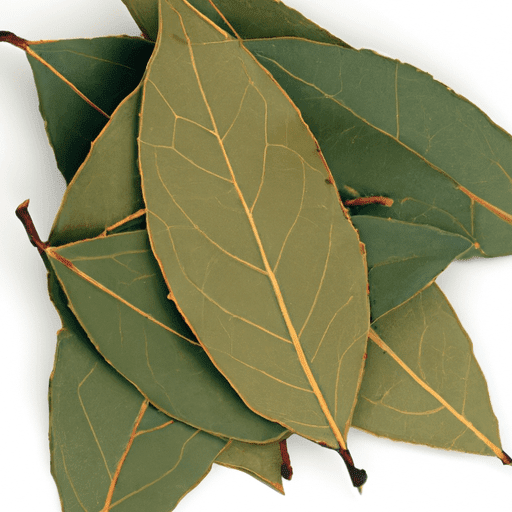Exploring Turkish Bay Leaf: A Versatile Herb with Rich History
If you’re a cooking enthusiast, you’ve surely come across Turkish bay leaf as a popular ingredient in many Mediterranean and Middle Eastern dishes. This aromatic herb, scientifically known as Laurus nobilis, offers a unique flavor profile that can elevate your culinary creations to new heights. In this post, we’ll delve into the world of Turkish bay leaf, exploring its taste, common uses in cooking, nutritional value, and intriguing history.
Taste and Aroma that Unleashes Culinary Magic
Turkish bay leaf is renowned for its distinct taste and fragrant aroma. When added to dishes, it imparts a subtle, slightly bitter flavor with notes of floral and floral undertones. The taste profile is often described as a combination of eucalyptus, clove, and mild pepper. This herb can infuse your dishes with a warm, earthy essence that enhances the overall taste experience.
Versatile Applications in the Culinary World
The uses of Turkish bay leaf in cooking are diverse and varied. It is a staple ingredient in traditional Mediterranean and Middle Eastern cuisines. One of the most common applications of bay leaf is in soups, stews, and sauces. Adding a couple of leaves to simmering broths imparts a deep and complex flavor that can make a simple dish truly remarkable.
Bay leaf also adds a unique dimension to rice pilaf, risottos, and braised meat dishes. Its aromatic properties infuse these dishes with an irresistible aroma, taking them to new culinary heights. Some adventurous cooks also experiment with using bay leaf in baking, where it can complement the flavors of bread and pastries.
Nutritional Value and Wellness Boost
Beyond its culinary appeal, Turkish bay leaf offers several health benefits. While it is not consumed in large quantities, this herb contains essential vitamins and minerals such as vitamin A, vitamin C, iron, manganese, and calcium.
Bay leaf is also known for its potential to aid digestion due to its high concentration of essential oils. Additionally, it exhibits antioxidant and anti-inflammatory properties, which may contribute to overall health and well-being.
A Walk through History
Turkish bay leaf has a fascinating history that spans centuries. The ancient Greeks and Romans held this herb in high regard, associating it with nobility, strength, and protection. In fact, bay leaves were often used to create laurel wreaths worn by emperors and victorious warriors.
Throughout history, bay leaf has also been used for its medicinal properties, such as to soothe headaches, calm the digestive system, and even repel insects. Today, it continues to be a staple ingredient in traditional Turkish cuisine and beyond, highlighting the enduring allure of this magical herb.
Interesting Facts about Turkish Bay Leaf
The Symbol of Victory: In ancient Greek mythology, bay leaf was considered a symbol of victory and accomplishment. It was believed that Apollo, the Greek god of music, poetry, and knowledge, cherished bay leaves and used them to create wreaths for successful individuals.
Dried vs. Fresh: While dried bay leaves are more commonly used in cooking due to their longer shelf life, fresh bay leaves offer a more vibrant flavor and aroma. If accessible, consider opting for fresh bay leaves to elevate your culinary creations.
Bay Leaves and Tea: Beyond savory dishes, bay leaves can also be steeped to create a fragrant and aromatic herbal tea. This soothing beverage is known to aid relaxation and digestion.
Variety of Uses: Apart from culinary purposes, bay leaves are sometimes used for crafting decorative wreaths, potpourri, and even essential oils due to their pleasant fragrance.
In conclusion, Turkish bay leaf is a remarkable herb that can work wonders in your culinary endeavors. With its distinct taste and aroma, this versatile ingredient adds depth to a wide array of dishes. Beyond its flavorful prowess, bay leaf brings with it a rich history and fascinating folklore, making it a captivating component of any kitchen. So, why not embark on a culinary adventure and discover the enchanting world of Turkish bay leaf?
Origin: Turkish bay leaf, also known as Mediterranean bay leaf, is native to the Mediterranean region and is common in countries like Turkey, Greece, and Italy. It comes from the evergreen bay tree, scientifically known as Laurus nobilis.
Common Uses: Turkish bay leaf is used as a flavoring agent in a variety of dishes, including soups, stews, and sauces. It is widely used in Turkish cuisine to enhance the taste of meat dishes, rice pilaf, and vegetable preparations. The aromatic fragrance of Turkish bay leaf is a key ingredient in many pickling formulas as well.
Nutritional Benefits: Although primarily used for its flavor, Turkish bay leaf also offers some nutritional benefits. It is a good source of vitamin A, vitamin C, iron, magnesium, and calcium. Additionally, Turkish bay leaves contain essential oils such as eugenol, which has antimicrobial properties.
Unique Properties and Historical Significance: Turkish bay leaf has been utilized for culinary and medicinal purposes for centuries. In ancient times, Greeks and Romans used to make wreaths from bay leaves to honor poets and victorious athletes. These laurel wreaths are still associated with achievement and honor today. Additionally, Turkish bay leaf has been used traditionally for its believed digestive, antiseptic, and diuretic properties. The unique aroma and flavor of Turkish bay leaf make it a prized ingredient in many cuisines around the world.




Use the share button below if you liked it.
It makes me smile, when I see it.